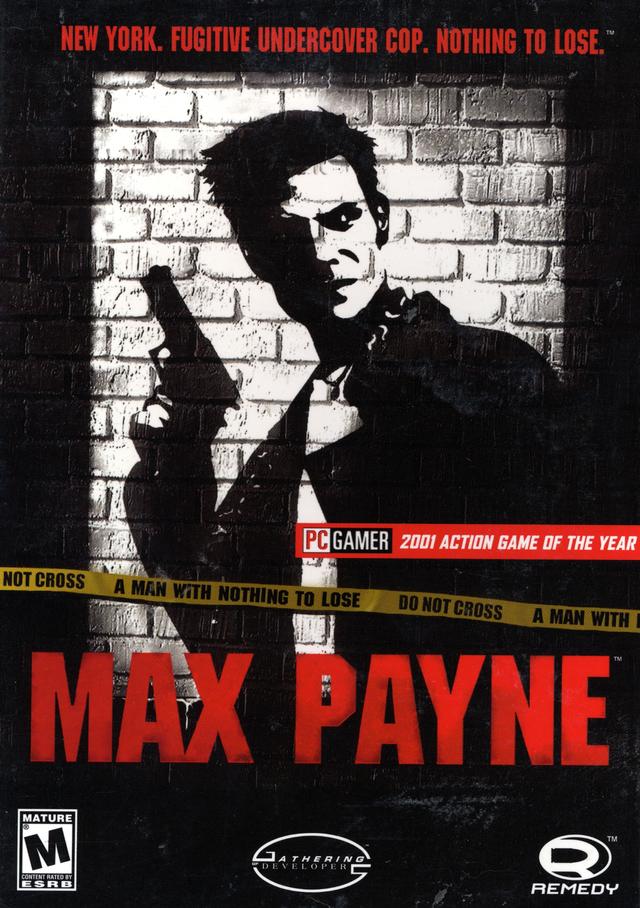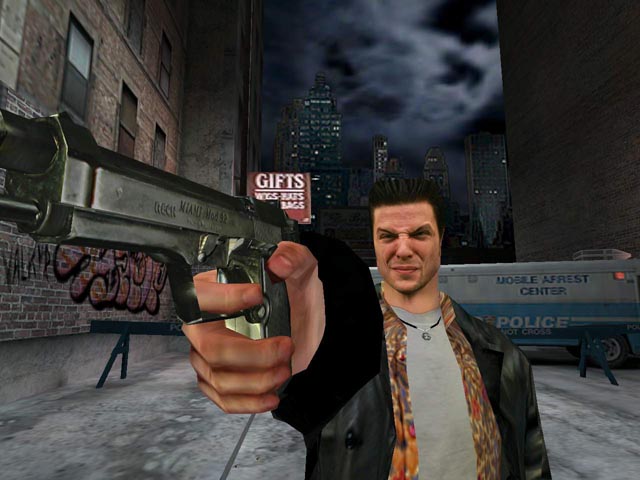Last updated on March 4, 2013
Max Payne definitely isn’t a game for children. Yet who else was playing it than me?
Having gotten a computer that could play PC games seriously around 2000 or so (I was REALLY into playing Unreal after seeing screenshots in Computer Gaming World), I also had a computer fast enough to endure the filesharing madness that came along with it. So it was that I happened to play Max Payne for the first time through the magic of Kazaa or Morpheus, I can’t tell. Honestly, who thought that was illegal back then? I didn’t know any better. I do own the game now in a spiffy DVD case, so it’s all good.
Anybody into video games at this point knew how awesome it was. It incapsulated the whole Matrix phenomenon into one gaming experience that, while highly repetitve, looked extremely cool. I wasn’t too hot with mouse and keyboard, so much of my early play was tapping into God mode, unlimited ammo and all the weapons. Thus, I would proceed to unleash hell in a breathtaking and horrific ballet of death.
Boy, that sure was fun! I told all my Christian buddies about my digital murder skills!
Kidding, kidding!
Playing the original now, I’m finding the game holds up much better than people would have you believe. I was motivated to start right over from the beginning because of Max Payne 3’s release (surprise, I own it) so I could see the full “Max Payne trilogy” in order. Although I know 3 isn’t made by Remedy, I’m pretty sure it isn’t that difficult to capture the feel of these games.
There’s exactly three mechanics in Max Payne. The first is shooting, which remains completely self-explanantory – point at something, fire. Aim for the head or chest as much as possible. Not very interesting, right? You could say that, but this is 2001, baby! We’re only about seven years off DooM at this juncture, so most games follow its template of high octane fast paced shooting action. There’s none of that sissy “cover” stuff we’ve been getting in recent years. Max Payne doesn’t deviate from the formula, but it doesn’t have to innovate there because it already has an ace up its sleeve.
Well, there’s a reason why the shooting is so simplistic: bullet-time. First coined by the Wachowskis on the set of the first Matrix film, Remedy uses the bullet-time slow motion effect as an actual game mechanic to great success. Most situations are, from Max’s standpoint, completely impossible. He takes a lot of damage, a realistic amount, from gunshot wounds, so playing the game without bullet-time may as well be impossible. However, this mechanic tilts the odds in your favor. Enemies slow down during bullet-time, but your aiming does not – this means you can drop 2-3 enemies before you even hit the ground from your John Woo-esque dive, as shown here:
It works surprisingly well. It’s difficult to wean yourself off constant caution like Gears of War and Rainbow Six: Vegas promote, but Max Payne tell you to charge right into the fray and kill everything. In fact, it’s usually the best strategy; hesitation will get you killed time and time again. Bullet-time makes that possible. It’s DooM with a different flavor, but that’s pretty refreshing in today’s video game market. Bullet-time has a meter attached to it; killing enemies nets you additional bullet-time, so you need to use it conservatively unless there’s a veritable army of mobsters waiting around the next door.
Of course, you can’t just jump around like an idiot and expect to win; diving right into a person aiming a sawed-off shotgun at your head isn’t going to help you out. Rather, bullet-time requires lots of shoot-dodging – basically jumping and shooting bullet-time. It’s a dodge, if the name is anything to go by, and it can prevent massive head trauma if you dodge smartly and use the right weapons. Slow weapons like shotguns aren’t useful in shootdodging because they take too long to fire, but dual Barettas? Sign me up! They look cool and actually help you aim and dodge at the same time. Remedy really nails the whole system, and it’s astonishing that no one has surpassed this particular mechanic. Even the Matrix licensed game failed in this regard because they gave you no control over when bullet-time and “cool things” would trigger. Well, those games (including Path of Neo) were also incomplete messes, but games based on movie licenses usually are.
Given its age, the AI isn’t the smartest in the world, but the enemies more than make up for it with numbers and damage. Whereas a game like DooM promote the fastest play possible, killing enemies as you memorize stage layouts, Max Payne presents the player with hosts of set pieces that have multiple enemies attacking at the same time. It’s your job to think of the most effective way to kill all of your foes, who have impeccable aim and won’t hesitate to surround you, throw grenades, or otherwise make your ability to live that much harder.
I’m on the lowest difficulty, but I’ve died a HOST of times. Max Payne has a dynamic difficulty that shifts depending on how bad/good you are. I imagine I’m at the cap, because the game spiked around the end of the first part and hasn’t let up since. This is primarily because of the game’s third major mechanic: painkillers. Painkillers are the only way to regain health in Max Payne, and they do so SLOWLY. That means that, if you want to survive a level, you have to measure this limited resource. Not only can you never carry more than eight, each painkiller only heals about a 1/4 of your life. Certainly, they’re placed in locations where the developers think you would need them in some way, but the player has to succeed in using bullet-time strategically and successfully. It’s fun decisions like this that make Max Payne special.
The film noir elements make the game all the more unique. Told in a graphic novel style, with flashbacks, nightmare dream sequences and a lot of witty and clever dialogue, Max makes for an intriguing and likable protagonists. Sure, he’s an anti-hero in some sense, but the root of his wife and baby’s killer goes further up the corporate ladder than even he could imagine.
Actually, I’m glad I didn’t make it too far when I was a kid; the game puts the genuine fear of God into you at points, with some occult stuff and disturbing dialogue from characters (“I’ve tasted the flesh of fallen angels”, anyone?). Still, it’s all tongue and cheek, and definitely not taken very seriously. It’s dark, but funny, and seeing a reference to Maleus Malificarum makes me smile (hey, who says a class on medieval sorcery and witchcraft wasn’t a good idea in college?). The frequent Norse mythological references (Remedy is Finnish, after all) is icing on the cake. To wit, it’s just a smartly “adult” game with just enough moral quandaries and questioning to make it interesting.
That’s a thing lacking in today’s game market. We’ve got ‘roided up “manly man” stereotypes or do-gooder superheroes nowadays, not the morally complex world of Max Payne. Sure, you could say that dialogue trees have created “complexisties” in video game ethics, but everything usually boils down to good or evil. Even “gray” isn’t that interesting in BioWare games because you lack engagement. Max Payne’s story gives you motivation for wanting to see him suceed in his vigilante justice when even the police aren’t enough to counter the dark forces at work.
Still, his quest to victory ultimately ends in an empty conquest. No vengeance or bout of violence will ever bring the circumstances back to where they were. Max is never going to get his family back, and later games will show how he deals with that particular problem (surprise, the nightmares don’t end). King Saul had a similar problem; he disobeyed God once during the herem (the destruction) of a particular situation, and God sends an evil spirit into him. It torments his sleep, but he doesn’t place the blame on his own actions; he blames David instead, and repeatedly tries to kill him. When he eventually dies, along with all of his sons, the death is something of a blessing for Saul’s life, having to have lived with guilt from the attempted murders and constant disobeying God’s direct commands.
Max Payne isn’t in exactly the same situation, but he’s dealing with the hand life dealt him with a solution that leads to death and destruction. An idea for an action movie? Absolutely (hey, it is a movie now, and a particularly mediocre one). Isn’t the essential message of Christianity to love God and love neighbor? Jesus says it enough! Here’s why, as Leviticus 19 says:
9 “When you reap the harvest of your land, you shall not reap your field right up to its edge, neither shall you gather the gleanings after your harvest. 10 And you shall not strip your vineyard bare, neither shall you gather the fallen grapes of your vineyard. You shall leave them for the poor and for the sojourner: I am the Lord your God.
11 “You shall not steal; you shall not deal falsely; you shall not lie to one another. 12 You shall not swear by my name falsely, and so profane the name of your God: I am the Lord.
13 “You shall not oppress your neighbor or rob him. The wages of a hired worker shall not remain with you all night until the morning. 14 You shall not curse the deaf or put a stumbling block before the blind, but you shall fear your God: I am the Lord.
15 “You shall do no injustice in court. You shall not be partial to the poor or defer to the great, but in righteousness shall you judge your neighbor. 16 You shall not go around as a slanderer among your people, and you shall not stand up against the life of your neighbor: I am the Lord.
17 “You shall not hate your brother in your heart, but you shall reason frankly with your neighbor, lest you incur sin because of him. 18 You shall not take vengeance or bear a grudge against the sons of your own people, but you shall love your neighbor as yourself: I am the Lord. (emphasis mine)
That’s a difficult thing to do, and no one says it’s easy, but it’s necessary. Otherwise, you’re looking for the wrong solutions to the same problems that have plagued humanity since the beginning. I suppose that’s why I find Max Payne engaging: it engages sin directly, shows its concequences, and isn’t afraid to show it.
Plus, shooting things in slow motion is fun, any way you slice it.


